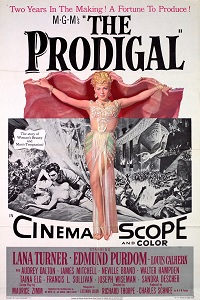
Battleground is a 1949 American war film that follows a company in the 327th Glider Infantry Regiment, 101st Airborne Division as they fight in the siege of Bastogne during the Battle of the Bulge, in World War II. It stars Van Johnson, John Hodiak, Ricardo Montalbán, and George Murphy, features James Whitmore, and was directed by William A. Wellman from a script by Robert Pirosh.

The Swan is a 1956 American romantic comedy-drama film directed by Charles Vidor from a screenplay by John Dighton. It is a remake of the 1925 silent film of the same name, itself based on the play of the same name by Ferenc Molnár.

The Bad and the Beautiful is a 1952 American melodrama that tells the story of a film producer who alienates everyone around him. The film was directed by Vincente Minnelli, written by George Bradshaw and Charles Schnee, and stars Lana Turner, Kirk Douglas, Walter Pidgeon, Dick Powell, Barry Sullivan, Gloria Grahame and Gilbert Roland. The Bad and the Beautiful won five Academy Awards out of six nominations in 1952, a record for the most awards for a movie that was not nominated for Best Picture or for Best Director.

Green Fire is a 1954 American CinemaScope and Eastmancolor adventure drama film released by Metro-Goldwyn-Mayer. It was directed by Andrew Marton and produced by Armand Deutsch, with original music by Miklós Rózsa. The picture stars Grace Kelly, Stewart Granger, Paul Douglas and John Ericson.
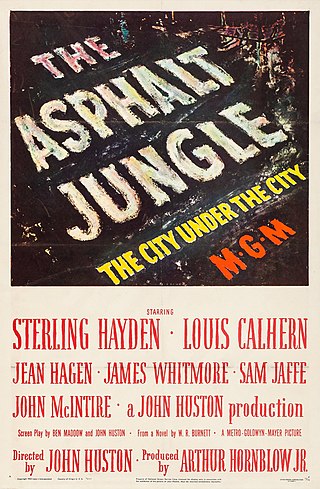
The Asphalt Jungle is a 1950 American film noir heist film directed by John Huston. Based on the 1949 novel of the same name by W. R. Burnett, it tells the story of a jewel robbery in a Midwestern city. The film stars Sterling Hayden and Louis Calhern, and features Jean Hagen, James Whitmore, Sam Jaffe, and John McIntire. Marilyn Monroe also appears in one of her earliest roles, as does Teresa Celli.

Athena is a 1954 American romantic musical comedy film directed by Richard Thorpe and starring Jane Powell, Edmund Purdom, Debbie Reynolds, Vic Damone, Louis Calhern, Steve Reeves, and Evelyn Varden. It was released by Metro-Goldwyn-Mayer.

The Glass Slipper (1955) is an American musical film adaptation of Cinderella, made by MGM, directed by Charles Walters and produced by Edwin H. Knopf from a screenplay by Helen Deutsch. The music score is by Bronislau Kaper, the cinematography by Arthur E. Arling, the art direction by Daniel B. Cathcart and Cedric Gibbons and costume design by Walter Plunkett and Helen Rose.
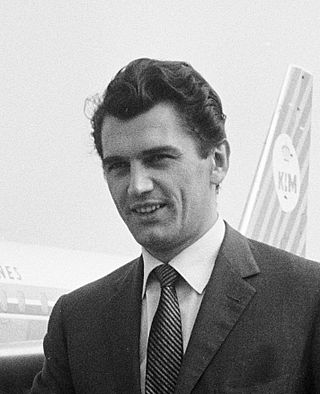
Edmund Anthony Cutlar Purdom was an English actor, voice artist, and director. He worked first on stage in Britain, performing various works by Shakespeare, then in America on Broadway and in Hollywood, and eventually in Italy. He is perhaps best known for his starring role in 1954's historical epic The Egyptian.
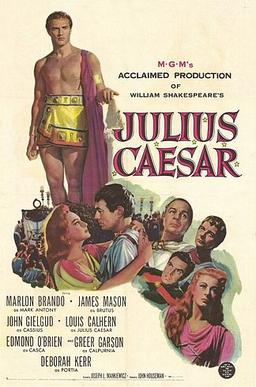
Julius Caesar is a 1953 American film adaptation of the Shakespearean play, directed by Joseph L. Mankiewicz and produced by John Houseman for Metro-Goldwyn-Mayer. It stars Marlon Brando as Mark Antony, James Mason as Brutus, Louis Calhern as Caesar, John Gielgud as Cassius, Edmond O'Brien as Casca, Greer Garson as Calpurnia, and Deborah Kerr as Portia.

Because You're Mine is a 1952 American musical comedy film starring Mario Lanza. Directed by Alexander Hall, the film also stars Doretta Morrow, James Whitmore, and Bobby Van.
Charles Schnee was an American screenwriter and film producer. He wrote the scripts for the Westerns Red River (1948) and The Furies (1950), the social melodrama They Live by Night (1949), and the cynical Hollywood saga The Bad and the Beautiful (1952), for which he won an Academy Award.

The Egyptian is a 1954 American epic historical drama film made by 20th Century-Fox. Filmed in CinemaScope with color by DeLuxe, it was directed by Michael Curtiz and produced by Darryl F. Zanuck. It is based on Mika Waltari's 1945 novel of the same name and the screenplay was adapted by Philip Dunne and Casey Robinson. Leading roles were played by Edmund Purdom, Bella Darvi, Jean Simmons, Victor Mature, Gene Tierney, Peter Ustinov, and Michael Wilding. Cinematographer Leon Shamroy was nominated for an Oscar in 1955.
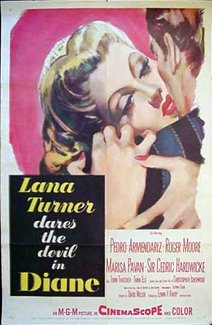
Diane is a 1956 American historical drama film about the life of Diane de Poitiers, produced by Metro-Goldwyn-Mayer, directed by David Miller, and produced by Edwin H. Knopf from a screenplay by Christopher Isherwood based on a story by John Erskine. The music score was composed by Miklós Rózsa, and Robert H. Planck was the cinematographer, who filmed in CinemaScope and Eastmancolor. The exceptionally lavish costumes were designed by Walter Plunkett.

Valley of the Kings is a 1954 American Eastmancolor adventure film made by Metro-Goldwyn-Mayer. It was written and directed by Robert Pirosh from a screenplay by Robert Pirosh and Karl Tunberg, "suggested by historical data" in the book Gods, Graves and Scholars by C. W. Ceram. The music was by Miklós Rózsa and the cinematography by Robert Surtees.

Big Leaguer is a 1953 American sports drama film starring Edward G. Robinson and was the first film directed by Robert Aldrich.
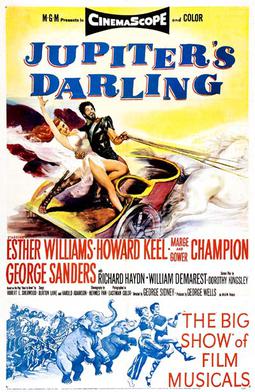
Jupiter's Darling is a 1955 American Eastman Color musical romance film released by MGM and directed by George Sidney filmed in CinemaScope. It starred Esther Williams as the Roman woman Amytis, Howard Keel as Hannibal, the Carthaginian military commander and George Sanders as Fabius Maximus, Amytis's fiancé. In the film, Amytis helps Hannibal swim the Tiber River to take a closer look at Rome's fortifications.
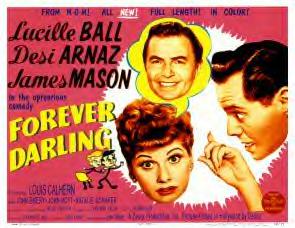
Forever, Darling is a 1956 American fantasy romantic comedy film directed by Alexander Hall, written by Helen Deutsch, and starring Lucille Ball, Desi Arnaz, and James Mason. In the film, Ball stars as a wife who tries to save her struggling marriage to a chemical engineer (Arnaz) with the help of her guardian angel (Mason). Louis Calhern and Natalie Schafer co-star in supporting roles.
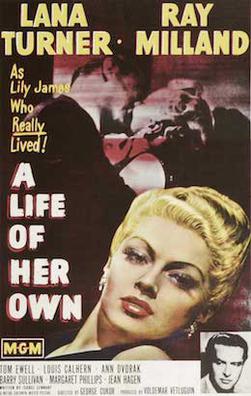
A Life of Her Own is a 1950 American melodrama film directed by George Cukor and starring Lana Turner and Ray Milland. The screenplay by Isobel Lennart focuses on an aspiring model who leaves her small town in the Midwest to seek fame and fortune in New York City. The film was produced by Voldemar Vetluguin and distributed by Metro-Goldwyn-Mayer.
Maurice Zimring, known as Maurice Zimm, was an American radio, television and film writer, whose most famous creation was the Creature from the Black Lagoon. The son of Jewish immigrants who settled in Iowa shortly after the turn of the century, Zimring moved to Los Angeles in the 1930s, and wrote for such mystery and drama radio series as Hollywood Star Playhouse and Murder By Experts under the pen name of Maurice Zimm.

Benjamin Thau was an American businessman who became vice-president of the Hollywood film studio Metro-Goldwyn-Mayer (MGM), a subsidiary of the Loew's theater chain. From 1928 he was in charge of casting, in the business of discovering and developing talented performers. He was known for his quiet and calming influence with often temperamental stars. Towards the end of his career he was head of the studio from 1956 to 1958.
